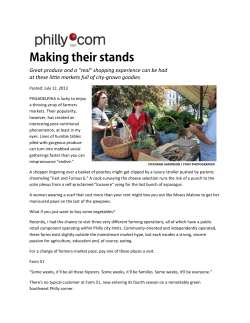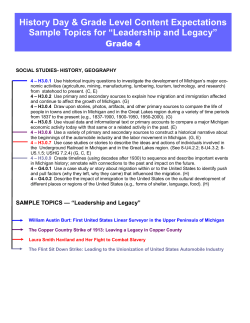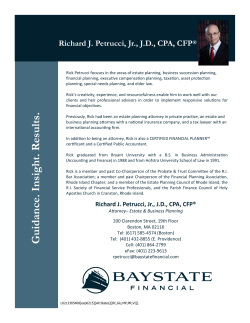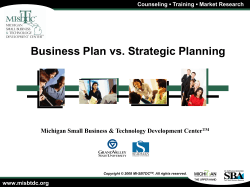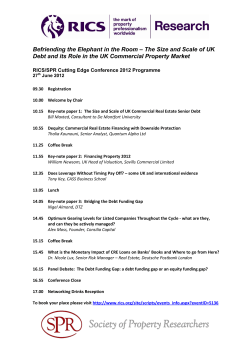
View My CV - Jenny G. Olson
February 2015 CURRICULUM VITAE JENNY G. OLSON Stephen M. Ross School of Business University of Michigan 701 Tappan Street, R5323 Ann Arbor, MI 48109 Cell Phone: (920) 420-9280 Office Phone: (734) 763-0057 Email: jennygin@umich.edu Web: www.jennyginolson.com EDUCATION 2015 Ph.D., Marketing (expected) Stephen M. Ross School of Business, University of Michigan 2009 M.A., Social Psychology Teachers College, Ball State University Certificate in Institutional Research 2007 B.S., Psychology and Human Development (Double Major) University of Wisconsin – Green Bay Summa Cum Laude with Honors in Psychology (GPA: 4.0/4.0) RESEARCH INTERESTS Consumption in Interpersonal Contexts Consumer Financial Decision Making Social Influence Moral Psychology MANUSCRIPTS IN THE REVIEW PROCESS Olson, Jenny, Brent McFerran, Andrea Morales, and Darren Dahl, “Earning the Right to Eat Organic: How Moral Judgments Depend on the Nature of the Target’s Income,” Revising for invited 2nd round review at the Journal of Consumer Research. Mourey, James, Jenny Olson, and Carolyn Yoon, “The Product-as-Person-Proxy Effect: Satisfying Social Needs via Consumer Products at the Expense of Interpersonal Interaction and Prosocial Behavior,” Revising for invited 2nd round review at the Journal of Consumer Research. Winner of the Best Working Paper Award at the 2011 ACR Annual Meeting SELECTED WORK IN PROGRESS Olson, Jenny and Scott Rick, “A Penny Saved is a Partner Earned: The Romantic Appeal of Savers,” Working paper. Winner of the Best Student Poster Award at the 2013 SJDM Annual Meeting Olson CV – Page 2 Selected Media Coverage: CNN, The Globe and Mail, HLN, The Huffington Post, Israel National Radio, The Los Angeles Times, MarketWatch, Men’s Health Magazine, Money Magazine, The Motley Fool, MSN Money, Psychology Today, Reuters, Time Magazine, The Today Show, The Washington Post, and Women’s Health Magazine Olson, Jenny and Scott Rick, “Managing Debt and Managing Each Other: Debt Management Decisions in Interpersonal Contexts,” Data collection in progress. Olson, Jenny, Brent McFerran, and Jeffrey Sanchez-Burks, “The Unintended Psychological Effects of Behavioral Tracking,” Data collection in progress. Do Joint Accounts Improve Marital Quality? (with Scott Rick, Deborah Small, and Eli Finkel; longitudinal data collection in progress) DISSERTATION “An Examination of Consumer Financial Decision-Making in Interpersonal Contexts” Chair: Scott Rick Committee: Katherine Burson, Brent McFerran, Leigh Tost, Robin Edelstein Proposal defended on March 20, 2014 The past five years have witnessed a surge of interdisciplinary research aimed at understanding and improving consumer financial decision-making. Most of this work has focused on how individuals approach financial decisions, but financial decisions are often subject to social influence and are made within the context of relationships (e.g., between spouses). Moreover, the outcomes of such decisions can be important determinants of relationship satisfaction. My dissertation provides a more complete understanding of consumer financial decision-making by examining how financial decisions influence interpersonal relationship dynamics, and how relationship dynamics influence financial decisions. My first essay examines how saving versus spending tendencies influence romantic attraction. The central hypothesis is that “savers” (people who, in economic terms, have a low marginal propensity to consume) would be assumed to possess broad self-regulatory resources, and this potential misperception would bias the extent to which savers are viewed as romantically and physically attractive. I first demonstrate, in a face-to-face, incentive-compatible study, that people can accurately distinguish between savers and spenders simply by glancing at them. Then, in several experiments, I find that savers are viewed as possessing greater general self-control than spenders, and perceived self-control increases savers’ romantic appeal (above and beyond potential alternative sources of savers’ appeal such as financial viability and reduced materialism). In addition, savers are expected to take better care of themselves, and this expectation favorably biases perceptions of savers’ physical attractiveness. However, because selfcontrol favors prudence over fun, dispositional and situational factors that increase the need for stimulation reduce the allure of savers. This essay elucidates how a fundamental consumption behavior (one’s tendency to spend or save) is perceived and is influential in romantic relationship formation. Spending habits influence not only initial attraction, but also relationship quality, particularly if a couple’s habits differ. How established couples structure their financial accounts (e.g., purely joint or purely separate) may ameliorate or exacerbate the financial and psychological effects of differences in partners’ natural spending habits. While a number of theoretical perspectives suggest that merging finances may foster a sense of closeness and investment in the relationship, merging finances may also bring about difficult conversations that strain relationships. My second essay examines whether couples benefit more Olson CV – Page 3 from joint or separate accounts in a longitudinal field experiment. I have recruited engaged and newlywed couples and randomly assigned them to maintain separate (checking and savings) accounts or to merge accounts. Couples in a control condition received no guidance on how to manage their money. I have begun to survey all couples to assess their marital and economic well-being and will continue to do so periodically. This is the first experiment that has the potential to shed light on how financial account structure influences relationships and thus may offer guidance to couples who face this important and difficult decision. Couples must not only decide how to manage their income and savings, but also their debt. Recent work has investigated how individuals navigate debt repayment decisions, but when debt is jointly held, such decisions often invite input from all indebted parties. Whether individual-level biases (e.g., focusing on debt size rather than interest rates) persist when decisions are jointly made is unclear. On the one hand, interpersonal deliberation may help to clarify the costs of suboptimal repayment strategies. On the other hand, deliberation among like-minded individuals can intensify pre-existing biases. My third essay assesses these conflicting hypotheses by examining the influence of interpersonal deliberation on debt management decisions. In an incentive-compatible experiment, I find that dyads behave less optimally than individuals, showing an enhanced tendency to focus on small debts even when larger debts have larger interest rates. Follow-up analyses and a simulation suggest that the dyad partner with the least financially optimal preferences has greater influence over joint outcomes. I find a similar pattern among groups of three people, suggesting that any type of interpersonal deliberation intensifies individuals’ costly tendency to underweight interest rates and focus on paying off small debts. HONORS AND AWARDS Rackham Predoctoral Fellowship, University of Michigan, 2014-2015 ($29,280 plus one year of tuition) “The most prestigious and substantial award the Rackham Graduate School offers,” this fellowship seeks to “support students working on dissertations that are unusually creative, ambitious and risk-taking.” Best Student Poster Award, Society for Judgment and Decision Making Annual Meeting, 2013 AMA Sheth Foundation Doctoral Consortium Fellow, 2013 Stark Graduate Scholarship and Fellowship, University of Michigan, 2012, 2013 ($16,000) Leo Burnett Scholarship, University of Michigan, 2012 ($4,000) Marketing and Public Policy Workshop and Doctoral Seminar Fellow, 2012 Best Working Paper Award, Association for Consumer Research North American Conference, 2011 Milton G. Kendrick and Josephine H. Kendrick Fellowship, University of Michigan, 2011 ($3,000) Dean’s Citation for Academic Excellence, Ball State University’s Graduate School, 2009 Phi Kappa Phi National Honor Society Fellowship Award, 2007-2008 ($5,000) Chancellor’s Leadership Medallion, University of Wisconsin – Green Bay, 2007 A university-wide award honoring “academic achievement and leadership as demonstrated through campus and community involvement during the student’s UW-Green Bay career.” Olson CV – Page 4 RESEARCH GRANTS Rackham Graduate Student Research Grant, University of Michigan, 2014 ($3,000) Russell Sage Foundation, Small Grants Program in Behavioral Economics, 2012 ($7,500) Transformative Consumer Research Grant, Association for Consumer Research, 2012 ($1,750) CONFERENCE PAPER PRESENTATIONS AND INVITED TALKS (*Presenter) *Mourey, J., Olson, J., and Yoon, C. (2015, February), “The Product-as-Person-Proxy Effect: Satisfying Social Needs via Consumer Products at the Expense of Interpersonal Interaction and Prosocial Behavior,” Society for Consumer Psychology Winter Conference; Phoenix Arizona. *Olson, J. and Rick, S. (2014, October), “Managing Debt and Managing Each Other: Debt Management Decisions in Interpersonal Contexts,” Association for Consumer Research North American Conference; Baltimore, Maryland. Special Session Co-chair (with Chiraag Mittal): “It's All Green to Me: How Intrapersonal and Interpersonal Factors Shape Consumers' Financial Decisions” Olson, J. and *Rick, S. (2014, October), “A Penny Saved is a Partner Earned: The Romantic Appeal of Savers,” Association for Consumer Research North American Conference; Baltimore, Maryland. *Olson, J. and Rick, S. (2014, August), “Managing Debt and Managing Each Other: Debt Management Decisions in Interpersonal Contexts,” Society for Consumer Psychology Summer Conference at the Annual Convention of the American Psychological Association; Washington, DC. Olson, J. and *Rick, S. (2014, July), “Managing Debt and Managing Each Other: Debt Management Decisions in Interpersonal Contexts,” Behavioral Decision Research in Management Conference; London, England. *Olson, J. and Rick, S. (2014, April), “A Penny Saved is a Partner Earned: The Romantic Appeal of Savers,” Haring Symposium, Indiana University; Bloomington, Indiana. *Olson, J. and Rick, S. (2014, March), “Managing Debt and Managing Each Other: Debt Management Decisions in Interpersonal Contexts,” Society for Consumer Psychology Winter Conference; Miami, Florida. *Olson, J. and Rick, S. (2013, November), “Managing Debt and Managing Each Other: Debt Management Decisions in Interpersonal Contexts,” Invited Talk at the Decision Consortium, University of Michigan; Ann Arbor, Michigan. *Olson, J., McFerran, B., Morales, A., and Dahl, D. (2013, February), “Are You Rich Enough to Eat Organic? Moral Judgments Depend on the Income of the Target,” Society for Consumer Psychology Winter Conference; San Antonio, Texas. *Olson, J. and Rick, S. (2013, February), “Savers are Sexier than Spenders, Unless You’re Craving Excitement,” Society for Consumer Psychology Winter Conference; San Antonio, Texas. Olson CV – Page 5 Olson, J., McFerran, B., Morales, A., and *Dahl, D. (2013, January), “Are You Rich Enough to Eat Organic? Moral Judgments Depend on the Income of the Target,” Invited Talk at the Judgment and Decision-Making Winter Symposium; Snowbird, Utah. *Olson, J. and Rick, S. (2012, November), “Savers are Sexier than Spenders, Unless You’re Craving Excitement,” Invited Talk at the Decision Consortium, University of Michigan; Ann Arbor, Michigan. *Mourey, J., Olson, J., and Yoon, C. (2012, October), “It’s Smiling at Me: Satisfying Social Needs Through Consumer Products…At the Expense of Genuine Relationships,” Association for Consumer Research North American Conference; Vancouver, British Columbia. *Olson, J., McFerran, B., Morales, A., and Dahl, D. (2012, October), “Created Equal? The Morality of Food and the People Who Eat It,” Association for Consumer Research North American Conference; Vancouver, British Columbia. *Olson, J. and Rick, S. (2012, October), “When is Saving Sexy? The Role of Construal Level in Shaping the Appeal of Savers and Spenders as Romantic Relationship Partners,” Association for Consumer Research North American Conference; Vancouver, British Columbia. *Olson, J. and Rick, S. (2012, April), “When is Saving Sexy? The Role of Construal in Shaping the Appeal of Savers and Spenders,” Interdisciplinary Science of Consumption Conference; Ann Arbor, Michigan. CONFERENCE POSTER PRESENTATIONS (*Presenter) *Olson, J. and Rick, S. (2014, May), “Managing Debt and Managing Each Other: Debt Management Decisions in Interpersonal Contexts,” Boulder Summer Conference on Consumer Financial Decision Making; Boulder, Colorado. *Olson, J. and Rick, S. (2013, November), “A Penny Saved is a Partner Earned: The Romantic Appeal of Savers,” Society for Judgment and Decision Making Conference; Toronto, Canada. *Olson, J. and Rick, S. (2013, January), “Savers are Sexier than Spenders, Unless You’re Craving Excitement,” Judgment and Decision Making Pre-Conference at the Society for Personality and Social Psychology Conference; New Orleans, Louisiana. *Mourey, J., *Olson, J., and Yoon, C. (2011, October), “It's Smiling at Me: Satisfying Social Needs Through Consumer Products,” Association for Consumer Research North American Conference; St. Louis, Missouri. *Olson, J. (2009, June), “The Effect of Young Women’s Sexual Self-Schemas on Emotional Responses to Sexualized Female Imagery in Magazine Advertising,” Society for the Scientific Study of Sexuality’s Eastern and Midcontinent Regions Conference; St. Petersburg, Florida. *Olson, J. (2008, November), “Exposure to the Explicit: Understanding the Impact of Sexualized Advertising on Females’ Romantic Relationships,” Indiana Psychological Association’s Annual Fall Conference; Indianapolis, Indiana. Olson CV – Page 6 *Olson, J. and Wilson-Doenges, G. (2007, August), “The Effects of Sexualized Magazine Advertising on Females’ Romantic Relationships,” Annual Convention of the American Psychological Association; San Francisco, California. TEACHING EXPERIENCE Instructor, Marketing Management (BBA), University of Michigan, Winter 2012 Instructor Evaluation: 4.9 on a 1-5 scale Teaching Assistant, Consumer Behavior (MBA), University of Michigan, Winter 2015 Teaching Assistant, Brand Management (MBA), University of Michigan, Fall 2010, Fall 2012 Teaching Assistant, Advertising Management (MBA and BBA), University of Michigan, Fall 2011, Winter 2013, Winter 2014 SERVICE ACTIVITIES Service to the Field: Student Representative: Executive Board of the Society for Judgment and Decision Making, 2014 Trainee Reviewer: Journal of Consumer Research, 2013 – Current Conference Reviewer for ACR: 2013 – Current (working papers) Conference Reviewer for SCP: 2014 – Current (competitive papers) Service to the Department and University: Consumer Behavior Reading Group Co-organizer, University of Michigan, 2013 Undergraduate Research Opportunity Program Sponsor, University of Michigan, 2011 – Current PROFESSIONAL AFFILIATIONS Association for Consumer Research Society for Consumer Psychology Society for Judgment and Decision Making Society for Personality and Social Psychology Association for Psychological Science DOCTORAL COURSEWORK (GPA: 4.0/4.0) Marketing Social Influences in Consumption Consumer Judgment and Decision Making Behavioral Research in Advertising Learning and Memory Applied Sensation and Perception Choice Theory and Modeling Structural Models Quantitative Methods Empirical Modeling Using Bayesian Methods David Wooten Katherine Burson and Scott Rick Rajeev Batra Carolyn Yoon Aradhna Krishna Fred Feinberg S. Sriram Puneet Manchanda Anocha Aribarg Olson CV – Page 7 Psychology Decision Processes Close Relationships Self-Control and Emotion Regulation Emotion and Motivation Sociology of Gender Stephanie Preston Robin Edelstein Ethan Kross Phoebe Ellsworth PJ McGann Methodology Research Design and Procedures Statistical Methods I, II Generalized Linear Models Structural Equation Modeling Dyadic Data Analysis Phoebe Ellsworth Richard Gonzalez Richard Gonzalez Rick Bagozzi Deborah Kashy and Rob Ackerman ABSTRACTS FROM OTHER RESEARCH PROJECTS Olson, Jenny, Brent McFerran, Andrea Morales, and Darren Dahl, “Earning the Right to Eat Organic: How Moral Judgments Depend on the Nature of the Target’s Income,” Revising for invited 2nd round review at the Journal of Consumer Research. This paper takes a behavioral ethics approach to examine how individuals are evaluated differently for engaging in the same prosocial activity—namely, purchasing organic food. We propose that because organic food is a moral choice associated with both health and wealth, the moral judgments people form of consumers and organizations who buy organic versus conventional food will differ based on the nature of the target’s income. Across six studies we demonstrate that organic food choices polarize moral judgments: whereas high-income individuals choosing organic (vs. conventional) food are perceived as more moral, those in the lowest income bracket receiving government assistance are perceived as less moral. This effect is driven by the belief that earning one’s income creates the right to make (costlier) prosocial choices. Our work makes an important contribution by showing that the same prosocial action leads to opposing moral judgments, and identifying the mechanism underlying this attribution reversal. Mourey, James, Jenny Olson, and Carolyn Yoon, “The Product-as-Person-Proxy Effect: Satisfying Social Needs via Consumer Products at the Expense of Interpersonal Interaction and Prosocial Behavior,” Revising for invited 2nd round review at the Journal of Consumer Research. Can consumer products replace the role of people when it comes to fulfilling social needs? Five experiments provide evidence for the “product-as-person-proxy” hypothesis that humanized (vs. nonhumanized) versions of consumer products can fulfill social needs that are customarily fulfilled by interpersonal interaction. Whereas prior research has explored social exclusion and anthropomorphism separately, the current work explores the interaction of these two constructs to test for the unique consequences of the product-as-person-proxy hypothesis for social engagement. Specifically, the results reveal that interacting with humanized (vs. non-humanized) products following social exclusion (1) produces positive mood effects comparable to actually interacting with people, (2) mitigates the need to exaggerate the size of one’s social network, (3) reduces the anticipated need to engage with close others in the future, and (4) decreases one’s willingness to engage in prosocial behavior (i.e., individuals are less likely to volunteer or donate money, presumably because they no longer suffer from the absence of social connections). Thus, examining the interplay between social exclusion and anthropomorphism offers novel insights regarding the potential social costs of consumption. Olson, Jenny, Brent McFerran, and Jeffrey Sanchez-Burks, “The Unintended Psychological Effects of Behavioral Tracking,” Data collection in progress. Olson CV – Page 8 Technological advances have enabled organizations to track, measure, and analyze consumers’ behavioral patterns in unprecedented ways. While some forms of tracking are perceived as beneficial to the common good (e.g., anti-terrorism programs), other forms can be construed as more invasive. For example, the collection of “Big Data” online means advertising networks are able to monitor consumers across multiple websites and build detailed profiles of their behavior and interests, often without active consent. Despite recent concerns about tracking, relatively little research is able to speak to how consumers respond to the psychological feeling of being watched. Thus, we developed a controlled but ecologically rich environment to examine the effects of feeling tracked across a variety of cognitive, emotional, and behavioral outcomes. Specifically, individuals experienced a mock retail environment—complete with promotional materials, consumer goods, and, in a Tracking condition, surveillance equipment—for five minutes. The results from a follow-up survey indicate that tracking shifts individuals’ cognitive focus, impairs memory, and leads to anxiety. Thus, the increased ease of collecting data may have unintended consequences, and ultimately be less beneficial to organizations than initially thought. REFERENCES Scott Rick Assistant Professor of Marketing University of Michigan Ross School of Business 701 Tappan Street, R5486 Ann Arbor, MI 48109 Ph: (713) 252-5654 srick@umich.edu Brent McFerran Assistant Professor of Marketing Simon Fraser University Beedie School of Business 8888 University Way Burnaby, BC, V5A 1S6 Ph: (778) 782-9729 brent.mcferran@sfu.ca Darren Dahl Senior Associate Dean, Faculty/Research Professor of Marketing University of British Columbia Sauder School of Business 2053 Main Mall Vancouver, BC, V5T 1Z2 Ph: (604) 822-1890 darren.dahl@sauder.ubc.ca Andrea Morales Professor of Marketing Arizona State University W. P. Carey School of Business 300 E. Lemon Street Tempe, AZ 85287 Ph: (480) 965-6122 acmorales@asu.edu Deborah Small Associate Professor of Marketing and Psychology University of Pennsylvania The Wharton School 760 Jon M. Huntsman Hall Philadelphia, PA 19104 Ph: (215) 898-6494 deborahs@wharton.upenn.edu Eli Finkel Professor of Psychology and Management and Organizations Northwestern University Kellogg School of Management 2001 Sheridan Road, Room 386 Evanston, IL 60208 Ph: (847) 491-3212 finkel@kellogg.northwestern.edu
© Copyright 2024

